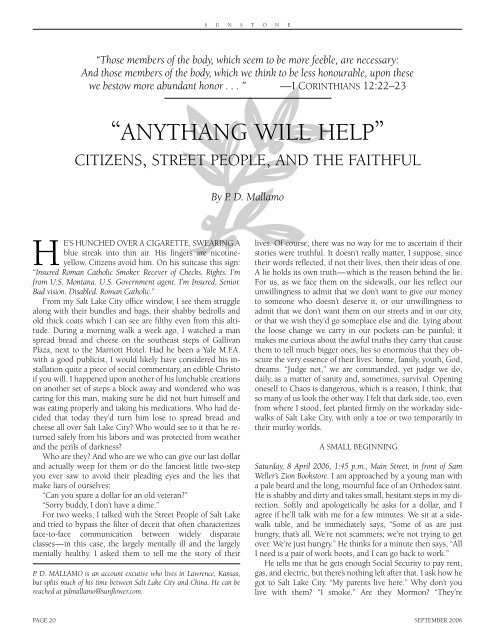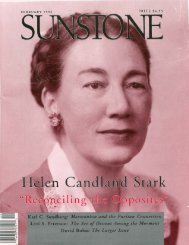00a_cover cmyk dark blue.qxp - Sunstone Magazine
00a_cover cmyk dark blue.qxp - Sunstone Magazine
00a_cover cmyk dark blue.qxp - Sunstone Magazine
Create successful ePaper yourself
Turn your PDF publications into a flip-book with our unique Google optimized e-Paper software.
S U N S T O N E<br />
“Those members of the body, which seem to be more feeble, are necessary:<br />
And those members of the body, which we think to be less honourable, upon these<br />
we bestow more abundant honor . . . ” —I CORINTHIANS 12:22–23<br />
“ANYTHANG WILL HELP”<br />
CITIZENS, STREET PEOPLE, AND THE FAITHFUL<br />
By P. D. Mallamo<br />
HE’S HUNCHED OVER A CIGARETTE, SWEARING A<br />
<strong>blue</strong> streak into thin air. His fingers are nicotineyellow.<br />
Citizens avoid him. On his suitcase this sign:<br />
“Insured Roman Catholic Smoker. Recever of Checks. Rights. I’m<br />
from U.S. Montana. U.S. Government agent. I’m Insured. Senior.<br />
Bad vision. Disabled. Roman Catholic.”<br />
From my Salt Lake City office window, I see them struggle<br />
along with their bundles and bags, their shabby bedrolls and<br />
old thick coats which I can see are filthy even from this altitude.<br />
During a morning walk a week ago, I watched a man<br />
spread bread and cheese on the southeast steps of Gallivan<br />
Plaza, next to the Marriott Hotel. Had he been a Yale M.F.A.<br />
with a good publicist, I would likely have considered his installation<br />
quite a piece of social commentary, an edible Christo<br />
if you will. I happened upon another of his lunchable creations<br />
on another set of steps a block away and wondered who was<br />
caring for this man, making sure he did not hurt himself and<br />
was eating properly and taking his medications. Who had decided<br />
that today they’d turn him lose to spread bread and<br />
cheese all over Salt Lake City? Who would see to it that he returned<br />
safely from his labors and was protected from weather<br />
and the perils of <strong>dark</strong>ness?<br />
Who are they? And who are we who can give our last dollar<br />
and actually weep for them or do the fanciest little two-step<br />
you ever saw to avoid their pleading eyes and the lies that<br />
make liars of ourselves:<br />
“Can you spare a dollar for an old veteran?”<br />
“Sorry buddy, I don’t have a dime.”<br />
For two weeks, I talked with the Street People of Salt Lake<br />
and tried to bypass the filter of deceit that often characterizes<br />
face-to-face communication between widely disparate<br />
classes—in this case, the largely mentally ill and the largely<br />
mentally healthy. I asked them to tell me the story of their<br />
P. D. MALLAMO is an account excutive who lives in Lawrence, Kansas,<br />
but splits much of his time between Salt Lake City and China. He can be<br />
reached at pdmallamo@sunflower.com.<br />
lives. Of course, there was no way for me to ascertain if their<br />
stories were truthful. It doesn’t really matter, I suppose, since<br />
their words reflected, if not their lives, then their ideas of one.<br />
A lie holds its own truth—which is the reason behind the lie.<br />
For us, as we face them on the sidewalk, our lies reflect our<br />
unwillingness to admit that we don’t want to give our money<br />
to someone who doesn’t deserve it, or our unwillingness to<br />
admit that we don’t want them on our streets and in our city,<br />
or that we wish they’d go someplace else and die. Lying about<br />
the loose change we carry in our pockets can be painful; it<br />
makes me curious about the awful truths they carry that cause<br />
them to tell much bigger ones, lies so enormous that they obscure<br />
the very essence of their lives: home, family, youth, God,<br />
dreams. “Judge not,” we are commanded, yet judge we do,<br />
daily, as a matter of sanity and, sometimes, survival. Opening<br />
oneself to Chaos is dangerous, which is a reason, I think, that<br />
so many of us look the other way. I felt that <strong>dark</strong> side, too, even<br />
from where I stood, feet planted firmly on the workaday sidewalks<br />
of Salt Lake City, with only a toe or two temporarily in<br />
their murky worlds.<br />
A SMALL BEGINNING<br />
Saturday, 8 April 2006, 1:45 p.m., Main Street, in front of Sam<br />
Weller’s Zion Bookstore. I am approached by a young man with<br />
a pale beard and the long, mournful face of an Orthodox saint.<br />
He is shabby and dirty and takes small, hesitant steps in my direction.<br />
Softly and apologetically he asks for a dollar, and I<br />
agree if he’ll talk with me for a few minutes. We sit at a sidewalk<br />
table, and he immediately says, “Some of us are just<br />
hungry, that’s all. We’re not scammers; we’re not trying to get<br />
over. We’re just hungry.” He thinks for a minute then says, “All<br />
I need is a pair of work boots, and I can go back to work.”<br />
He tells me that he gets enough Social Security to pay rent,<br />
gas, and electric, but there’s nothing left after that. I ask how he<br />
got to Salt Lake City. “My parents live here.” Why don’t you<br />
live with them? “I smoke.” Are they Mormon? “They’re<br />
PAGE 20 SEPTEMBER 2006

















